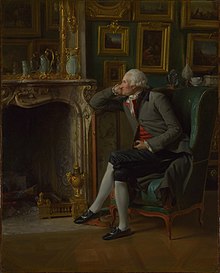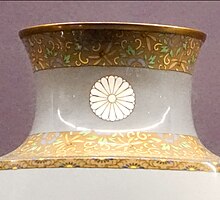
The politics of Venezuela occurs in a framework explained in Government of Venezuela.
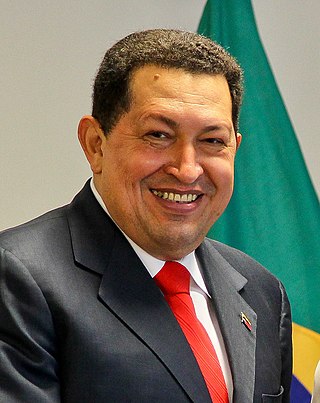
Hugo Rafael Chávez Frías was a Venezuelan politician and military officer who served as president of Venezuela from 1999 until his death in 2013, except for a brief period of forty-seven hours in 2002. Chávez was also leader of the Fifth Republic Movement political party from its foundation in 1997 until 2007, when it merged with several other parties to form the United Socialist Party of Venezuela (PSUV), which he led until 2012.
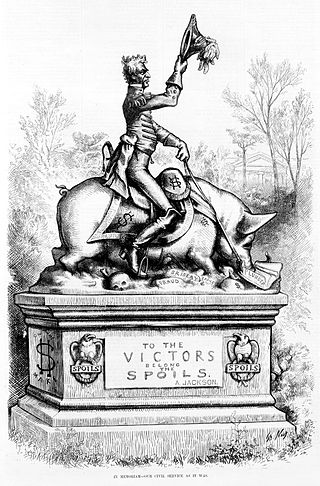
In politics and government, a spoils system is a practice in which a political party, after winning an election, gives government jobs to its supporters, friends (cronyism), and relatives (nepotism) as a reward for working toward victory, and as an incentive to keep working for the party—as opposed to a merit system, where offices are awarded or promoted on the basis of some measure of merit, independent of political activity.

Tammany Hall, also known as the Society of St. Tammany, the Sons of St. Tammany, or the Columbian Order, was an American political organization founded in 1786 and incorporated on May 12, 1789, as the Tammany Society. It became the main local political machine of the Democratic Party and played a major role in controlling New York City and New York State politics, and helped immigrants, most notably the Irish, rise in American politics from the 1850s into the 1960s. Tammany usually controlled Democratic nominations and political patronage in Manhattan for over 100 years following the mayoral victory of Fernando Wood in 1854, and used its patronage resources to build a loyal, well-rewarded core of district and precinct leaders; after 1850, the vast majority were Irish Catholics due to mass immigration from Ireland during and after the Irish Famine of the late 1840s.
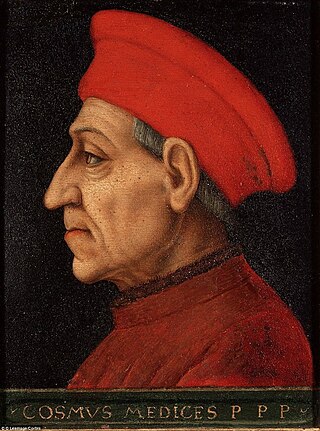
Cosimo di Giovanni de' Medici was an Italian banker and politician who established the Medici family as effective rulers of Florence during much of the Italian Renaissance. His power derived from his wealth as a banker and intermarriage with other rich and powerful families. He was a patron of arts, learning, and architecture. He spent over 600,000 gold florins on art and culture, including Donatello's David, the first freestanding nude male sculpture since antiquity.

In the politics of representative democracies, a political machine is a party organization that recruits its members by the use of tangible incentives and that is characterized by a high degree of leadership control over member activity. The machine's power is based on the ability of the boss or group to get out the vote for their candidates on election day.

A failed coup d'état on 11 April 2002 saw the president of Venezuela, Hugo Chávez, ousted from office for 47 hours before being restored to power. Chávez was aided in his return to power by popular support and mobilization against the coup by loyal ranks in the military.

The Constitution of the Bolivarian Republic of Venezuela is the current and twenty-sixth constitution of Venezuela. It was drafted in mid-1999 by a constituent assembly that had been created by popular referendum. Adopted in December 1999, it replaced the 1961 Constitution, the longest-serving in Venezuelan history. It was primarily promoted by then President of Venezuela Hugo Chávez and thereafter received strong backing from diverse sectors, including figures involved in promulgating the 1961 constitution such as Luis Miquilena and Carlos Andrés Pérez. Chávez and his followers (chavistas) refer to the 1999 document as the "Constitución Bolivariana" because they assert that it is ideologically descended from the thinking and political philosophy of Simón Bolívar and Bolivarianism. Since the creation of the Constituent National Assembly in August 2017, the Bolivarian government has declared the 1999 constitution suspended until a new constitution is created.
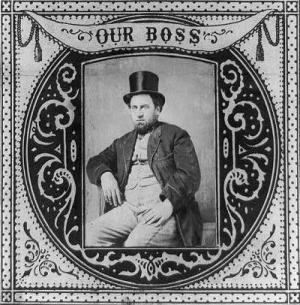
In politics, a boss is a person who controls a faction or local branch of a political party. They do not necessarily hold public office themselves; most historical bosses did not, at least during the times of their greatest influence. Numerous officeholders in that unit are subordinate to the single boss in party affairs. Bosses may base their power on the support of numerous voters, usually organized voting blocs, and manage a coalition of these blocs and various other stakeholders. When the party wins, they typically control appointments in their unit, and have a voice at the higher levels. Reformers typically allege that political bosses are corrupt. This corruption is usually tied to patronage: the exchange of jobs, lucrative contracts and other political favors for votes, campaign contributions and sometimes outright bribes.
Localism is a range of political philosophies which prioritize the local. Generally, localism supports local production and consumption of goods, local control of government, and promotion of local history, local culture and local identity. Localism can be contrasted with regionalism and centralized government, with its opposite being found in unitarism.

The Cook County Democratic Party is an American county-level political party organization which represents voters in 50 wards in the city of Chicago and 30 suburban townships of Cook County. The organization has dominated Chicago politics since the 1930s. It relies on an organizational structure of a ward or township committeeperson to elect candidates. At the height of its influence under Richard J. Daley in the 1960s when political patronage in employment was endemic in American cities, it was one of the most powerful political machines in American history. By the beginning of the 21st century the party had largely ceased to function as a machine due to the legal dismantling of the patronage system under the Shakman Decrees issued by the federal court in Chicago. The current Chair is Toni Preckwinkle, who is also the elected Cook County Board president.

The Church Patronage (Scotland) Act 1711 or Patronage Act is an Act of the Parliament of Great Britain. The long title of the act is An Act to restore the Patrons to their ancient Rights of presenting Ministers to the Churches vacant in that Part of Great Britain called Scotland. Its purpose was to allow the noble and other Patrons in Scotland to gain control over the Church of Scotland parish churches again, having lost that custom in the Glorious Revolution.
Chavismo, also known in English as Chavism or Chavezism, is a left-wing populist political ideology based on the ideas, programs and government style associated with the Venezuelan President between 1999 and 2013 Hugo Chávez that combines elements of democratic socialism, socialist patriotism, Bolivarianism, and Latin American integration. Supporters of Hugo Chávez and Chavismo are known as Chavistas.
Bolibourgeoisie or Bolichicos are terms describing the new bourgeois created by the Venezuelan government of Hugo Chávez and Chavismo, made up of people who became rich under the Chávez administration. The term was coined by journalist Juan Carlos Zapata to "define the oligarchy that has developed under the protection of the Chávez government".
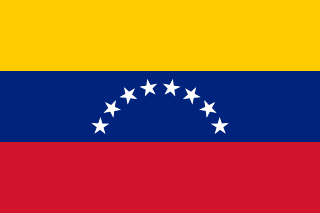
The level of corruption in Venezuela is very high by world standards and is prevalent throughout many levels of Venezuelan society. Discovery of oil in Venezuela in the early 20th century has worsened political corruption. The large amount of corruption and mismanagement in the country has resulted in severe economic difficulties, part of the crisis in Venezuela. A 2014 Gallup poll found that 75% of Venezuelans believed that corruption was widespread throughout the Venezuelan government. Discontent with corruption was cited by demonstrators as one of the reasons for the 2014 and 2017 Venezuelan protests.
This article details the history of the Catholic Church in Brazil from the colonial era until the modern era. The Federative Republic of Brazil is the largest country in South America. It is the world's fifth largest country, both by geographical area and by population with over 201 million people. Catholicism is the country's predominant faith with approximately 64.6% of the population identifying as a member of the religion. Brazil has the world's largest Catholic population.
Clientelism or client politics is the exchange of goods and services for political support, often involving an implicit or explicit quid-pro-quo. It is closely related to patronage politics and vote buying. Clientelism involves an asymmetric relationship between groups of political actors described as patrons, brokers, and clients. In client politics, an organized interest group benefits at the expense of the public. Client politics may have a strong interaction with the dynamics of identity politics. This is particularly common in an elite pluralist or rigidly duopolistic system, such as in the United States, where lobbying can have considerable power shaping public policy. The opposite of client politics is 'entrepreneurial' politics, or conviction politics.

Patronage (clientela) was the distinctive relationship in ancient Roman society between the patronus ("patron") and their cliens ("client"). The relationship was hierarchical, but obligations were mutual. The patron was the protector, sponsor, and benefactor of the client; the technical term for this protection was patrocinium. Although typically the client was of inferior social class, a patron and client might even hold the same social rank, but the former would possess greater wealth, power, or prestige that enabled him to help or do favors for the client. From the emperor at the top to the commoner at the bottom, the bonds between these groups found formal expression in legal definition of patrons' responsibilities to clients. Patronage relationship were not exclusively between two people and also existed between a general and his soldiers, a founder and colonists, and a conqueror and a dependent foreign community.
The Shakman decrees are a series of Federal court orders regarding government employment in Chicago, which were issued in 1972, 1979, and 1983, in response to a lawsuit filed by civic reformer Michael Shakman. The decrees bar the practice of political patronage, under which government jobs are given to supporters of a politician or party, and government employees may be fired for not supporting a favored candidate or party.
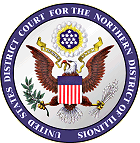
Shakman v. Democratic Organization of Cook County, No. 1:69-cv-02145, is a case in the United States District Court for the Northern District of Illinois regarding political patronage in the hiring of public officials and First Amendment and Fourteenth Amendment rights. The case resulted in negotiations from 1969-1983 that brought to fruition the Shakman Decrees, largely reducing political corruption in the Chicago government. Parts of the case are still being negotiated to this day.
